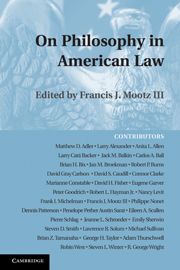Book contents
- Frontmatter
- Contents
- Introduction
- PART I KARL LLEWELLYN AND THE COURSE OF PHILOSOPHY IN AMERICAN LAW
- PART II PHILOSOPHICAL PERSPECTIVES ON LAW
- PART III AREAS OF PHILOSOPHY AND THEIR RELATIONSHIP TO LAW
- PART IV PHILOSOPHICAL EXAMINATIONS OF LEGAL ISSUES
- PART V LAW, RHETORIC, AND PRACTICE THEORY
- PART VI QUESTIONING THE RELATIONSHIP BETWEEN PHILOSOPHY AND AMERICAN LAW
- 28 Law and Philosophy at Odds
- 29 Jurisprudence: Beyond Extinction?
- 30 Law and Philosophy in the Hyperreal
- 31 Philosophy? In American Law?
- PART VII COMMENTARIES
- Contributors and Selected Bibliography
- Name Index
- References
30 - Law and Philosophy in the Hyperreal
Published online by Cambridge University Press: 31 July 2009
- Frontmatter
- Contents
- Introduction
- PART I KARL LLEWELLYN AND THE COURSE OF PHILOSOPHY IN AMERICAN LAW
- PART II PHILOSOPHICAL PERSPECTIVES ON LAW
- PART III AREAS OF PHILOSOPHY AND THEIR RELATIONSHIP TO LAW
- PART IV PHILOSOPHICAL EXAMINATIONS OF LEGAL ISSUES
- PART V LAW, RHETORIC, AND PRACTICE THEORY
- PART VI QUESTIONING THE RELATIONSHIP BETWEEN PHILOSOPHY AND AMERICAN LAW
- 28 Law and Philosophy at Odds
- 29 Jurisprudence: Beyond Extinction?
- 30 Law and Philosophy in the Hyperreal
- 31 Philosophy? In American Law?
- PART VII COMMENTARIES
- Contributors and Selected Bibliography
- Name Index
- References
Summary
Ah the old questions, …
Ah, the old answers, …
How they love the old answers …
– From Samuel Beckett, Endgame (A Play in One Act), as modified by the authorNeither law nor philosophy are free. Both are beholden to and shaped by cultural and rhetorical logics of which they remain almost entirely unaware. Inasmuch as these logics construct both enterprises rather flatteringly as autonomous and in charge of their own intellectual action, it is doubtful that the resulting comedy of errors will end any time soon. As for legal studies (philosophical or otherwise) its main modus operandi is to misapprehend the character of law in simplistic ways that give rise to a set of pseudo-problems, which in turn enable legal thinkers to go to outrageous lengths in rendering the original misprision complex, intricate, multilayered, and seemingly sophisticated. This too makes it unlikely that the comedy will end any time soon. At this point, one would want to speak to legal philosophers out of both sides of one's mouth. One would want to say: “Look, don't be so philosophical about it all: the law can't take it. It cannot support or sustain such intense philosophical attention. It's just not that sort of thing.”
- Type
- Chapter
- Information
- On Philosophy in American Law , pp. 257 - 264Publisher: Cambridge University PressPrint publication year: 2009

